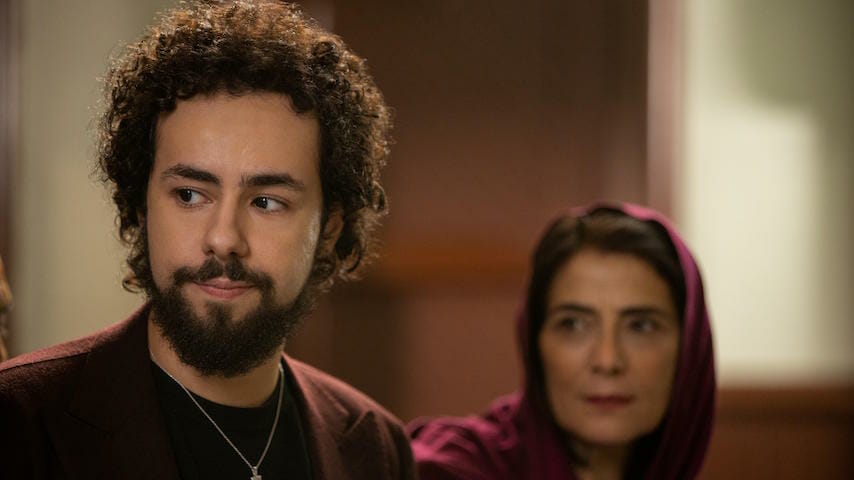Ramy Season 2 Burns Its Bridges, Loses Its Laughs, and Doesn’t Look Back
Photo Courtesy of Hulu
The comedian-creator wields self-conscious television as a weapon, entirely absorbed by one character’s point-of-view and inner workings. A biting blade that can opine and observe as sharply as any one-liner, these small-scale examinations frequently skin awkwardness to reveal the meaty depths of anxiety and fear underneath. But disciples of self-devotion still require us to care about what happens to those around them. Self-destruction viewed myopically doesn’t hurt as much as experiencing it within its full social context. As Ramy completely gives into its lead’s grasping need during the Hulu drama’s second season, this all-consuming self-absorption—which is supposed to be its irritating, affecting point—robs the previously rich show of its lush dressings and leaves the season’s powerful supporting solar system annihilated by the yawning black hole of need that is its sadsack antihero.
In the first of ten half-hour Season 2 episodes—from co-creators Ramy Youssef (who also stars, co-writes, and [sometimes] directs), Ari Katcher, and Ryan Welch—the fictionalized version of Ramy is back from Egypt, distraught over his now-ended romantic fling with his cousin, and spiritually empty. This season steers hard into the angsty drama that was always a present element in the first season’s colorful and unique look into Ramy’s Muslim community, leaving the star’s hilarious Jersey friend group to pick up the slack while he tragically looks to fill his various personal voids with religion, gummy worms, and women.
The first of those salves leads to the season’s greatest new addition: Mahershala Ali’s Sheikh. Ali is an overwhelming presence, stony and serious, who accepts Ramy as a student after the man-child recommits to devoting himself to Islam. Their scenes together—or rather, Ali’s scenes with anyone in the show—are ridiculously one-sided. Either his scene partners aren’t directed to match his energy (perhaps trying to find comedy in the unevenness) or are incapable of doing so. Youssef mumbles and stammers through their scenes with the energy of a kid dragged out of their room to be social with a distant relative, while Ali’s words come down as calm commands; his deadpan and wry smirks as he intensely delivers ridiculous lines show off a great comic talent different than, but of a similar caliber as, another leading man whose imposing handsomeness masks a great capacity for silliness: Jon Hamm.
But even one great supporting performance, itself overcoming a relatively one-note character, doesn’t make the season any less disappointing. While Ramy’s disingenuous religious devotion is sold as complex (it was in the first season), it never feels like anything other than a selfish, self-righteous person bulldozing their way through their social circle. Youssef’s mewling neediness and pleading wide eyes of his youthful blank face—which he successfully warps from charming to grating this time around—make his self-deceit obvious from the start to us and everyone else in the show. Ramy’s disaffected spiraling is therefore straightened out into an unaffecting line—a car slowly driving, Bob’s Burgers-style, into the only other one in the parking lot—that finds itself in a far more suitable position for its arc in the finale.
That arc attempts to be like if Lena Dunham, Louis C.K., or another sitcom oversharer decided to become an ascetic on their way to rock bottom. What if a show’s comic neurosis wasn’t focused around day-to-day minutiae because of a general post-modern attitude towards slicing up life, but because of an inability to grasp the bigger things life has to offer? Here, jerking off in a bathroom isn’t a funny, telegraphed end to Seinfeld’s “The Contest,” but a sign of spiritual emptiness.
The rare jokes are mostly masturbation humor—an ironically fitting topic that is wrung dry and utterly depleted after this season, if it wasn’t already rubbed raw after the first—and the Apatow-like intersections of gross-out gags and deadly seriousness ramble on for Apatow-like stretches of time. Youssef’s mumblecore dialogue is festooned with smirking decorations, but often they’re just clever rhetorical devices hinting at humorous connections without punchlines. The sole laughs come from Dave Merheje, whose manic energy had me wishing I was watching his show, and some of the season’s Atlanta-like surrealism. Season 2’s most Under the Silver Lake moment, where Omar Metwally amusingly steals scenes as an ultra-rich eccentric J. Peterman figure, works best because it’s finally something so bizarre it escapes and reframes the show’s Ramy-only perspective.
-

-

-

-

-

-

-

-

-

-

-

-

-

-

-

-

-

-

-

-

-

-

-

-

-

-

-

-

-

-

-

-

-

-

-

-

-

-

-

-








































